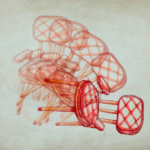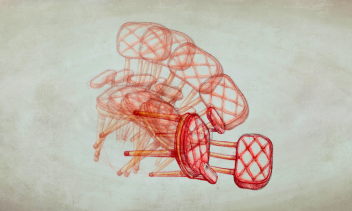In one of the first classes in my psychology doctoral program, my professor began our first lecture by asking each of us to state our names and that of our personal psychoanalyst. My classmates and I were somewhat shocked by the intrusive question (being forced to name your analyst is a major no-no). I didn’t want to answer the question, regardless of whether or not I had an analyst, but I thought it best not to be confrontational and settled on a plan. When my turn came, I smiled, said my name, and identified my analyst as “Dr. Luzzato.” Puzzled, the professor insisted he never met nor heard of Dr. Luzzato, and asked me about his approach. Dr. Luzzato, I told my professor, was a fantastic analyst whose primary approach aimed to focus his clients on their purpose in the world.
The truth to my answer was more complicated: Rabbi Moshe Chaim Luzzato—known by his acronym “Ramchal”—was no psychoanalyst in the formal sense. My explanation of his “approach” came from the opening line of his Messilat Yesharim. I thought I got away easily until my Italian classmate Jimmy asked me for Dr. Luzzato’s number. He was seeking a new analyst and thought Dr. Luzzato might be the right guy for him, too.
When I went to night seder that night and told my friends about the “great shtick” I pulled off, a lively debate ensued as to whether I avoided a minefield or stepped right into one. One friend mused: “Are we saying that psychoanalysis, and psychotherapy in general, is interchangeable with mussar, chassidus, and spiritual guidance? Are Rabbis and psychologists one and the same?”
My answer then, and my answer now, is emphatically “No!” Rabbis and teachers are not the same as psychologists and other mental health professionals. Their roles are different and definitely not substitutable with one another. This is not only because the former are unlicensed and the latter better be if you are going to rely upon them (though honestly that alone would be reason enough). Licensure is more than a technicality—it assures credibility that the person you are speaking with is qualified (as determined by a licensing body) to provide the psychotherapy you seek.
As my colleague Dr. Jacob Freedman likes to note: In the same way a person with problems with his lungs and breathing goes to a pulmonologist and someone with problems with his ears, nose and throat would visit an otolaryngologist, one with emotional issues should not go to “some guy” who claims expertise in some Far Eastern untested treatment involving strange, and sometimes dangerous, exercises and techniques. Rather, they ought to go to a (licensed) psychologist, as licensure provides accountability. Accountability ensures people act responsibly, providing care safely and responsibly from their actual expertise.
This does not mean I am opposed to speaking to rabbis, teachers, or mashgichim/chot (spiritual counselors) for guidance. I cherish those relationships and share advice with all of them. But, when choosing whether to go to a psychologist or a rebbe, one must discern what they are looking for and who can best provide it. As someone who has played both roles—mental health clinician and also rabbi (but never both at the same time)— and debated the issue of when to seek which type of assistance, I’ve learned to ask myself certain questions to figure it out.
1. Do I Want an Answer or a Collaboration?
While different types of mental health professionals work in different styles, the role of the therapist is not to “tell you what to do.” Even in the more behavioral models where techniques are taught and homework and exercises assigned (CBT and DBT, for instance), the role of the therapist is not to offer autocratic, hierarchical ruling. In other words, a therapist is not supposed to be a posek, providing direct rulings on what and how to act or think. Therapists and their clients work collaboratively to help clients reach their own chosen treatment goals. And while the matter is often debated by Orthodox mental health professionals, it is not their role to impose halachic or hashkafic standards onto their clients—that belongs to a rabbi or spiritual counselor.
Rabbis and teachers definitionally operate in more of a hierarchical role. When we have questions, we tend to turn to our elders for perspective and psak. We want them to tell us what to do. No one wants an answer to their kashrus question with a long analysis of what the rabbi might think. We want an answer. It’s similar to faith-related questions: We want our rabbis and teachers to provide concrete answers—to be the links in the mesorah that we can hook into.
In fact, this is one of the areas where rabbis and therapists have successfully collaborated. Where there has been a need and opportunity to work with both a rabbinic or spiritual counselor and a therapist, good treatment practice—both from the poskim and the psychological research—calls for collaboration on all sides. It begins with every member of the team knowing their role and how it helps the client at the center achieve their goals.
2. Is This a Human Issue or a Jewish Issue?
Rav Benzion Kokis—mashgiach at Beis Medrash Govoha and rabbi of Khal Zichron Mordechai—told the story of a young kollel wife who complained that her husband, a recovering addict, had become “a talmid” of Bill Wilson, the originator of Alcoholics Anonymous and developer of the 12 Step programs. This woman asked Rav Kokis to help her integrate the new “secular influence” of Bill Wilson and his approach into their otherwise religious home. Rav Kokis responded by citing his rebbe, Rav Shlomo Wolbe, who noted that there is a concept of derech eretz (lit. the way of the world) that goes into building a healthy human being or what we might call a “mentsch.” Derech eretz, we are told, precedes the Torah. Rav Wolbe explained that one needs to be a healthy mentsch before one can be fully prepared for complete Torah life. Universal human problems that affect every person’s menschlichkeit, he added, can be addressed well by Bill Wilson and many other dedicated therapists.
This is a great point for choosing a guide. If the issue you are seeking help with is a human difficulty—such as emotional challenges like anxiety, depression, addictive behaviors, or trauma—then they are best addressed by those trained to handle derech eretz. If your issue is one of Torah, then the proper avenue is with the Torah experts.
However, once again, both a good therapist and a good spiritual advisor will recognize whether each is overstepping a boundary and when to call in the other’s expertise. For instance, when working with a person suffering from a religious form of Obsessive Compulsive Disorder which is more of a derech eretz-type of issue, the proper place to seek assistance is with a good OCD therapist. At the same time, a rabbi’s guidance can be invaluable in successful treatment planning and execution as it relates to religious matters.
3. Am I Looking for Spiritual Growth or Emotional Healing?
Rabbis and Torah teachers are primarily interested in fostering growth in their students. In that regard, the steps, goals, advice, and techniques that good rebbeim and teachers use will be Torah-based and primed for spiritual growth. And while at times Torah teachers might encourage their students to “slow down” if they think students are “moving too fast” in sincere religious growth—especially common among gap year programs—the Torah guide still ultimately wants to inspire Torah growth.
At the same time, when one needs to heal from past experiences—such as trauma or anxiety-producing events—a good therapist is better equipped to help a person figure out how they arrived at a particular place in life and how he can process, heal, and move forward.
Does that mean that a therapist cannot, or will not, successfully utilize Torah sources and values in treatment? Certainly not! Good Orthodox therapists are good Orthodox Jews—and that means we speak Torah language. In fact, my colleague and friend Dr. David Rosmarin is one of the country’s greatest experts on integrating spirituality into psychotherapy. But, to be clear, while therapists might use Torah concepts as tools to help the client get to the goal of healing, Torah growth is not their focus in treatment.
‘Paging Rabbi/Dr. Luzzato’
Rabbi Lipa Geldwerth, a well-regarded rabbi in Brooklyn, was once approached by several students who were curious about who understood humans better—the Ramchal, or psychologists like Sigmund Freud and Aaron Beck?
Rav Geldwerth responded by asking them who knew washing machines better—the Maytag designer, or the Maytag repairman? He explained that the designer knows the machine’s design inside-out while the repairman knows the machine outside-in. “The Ramchal,” he said, “understood humans inside-out—the way we are supposed to be. The psychologist knows the person outside-in—or what to do when a client seeks repair. ”
When choosing between a rabbi or psychologist, the key is choosing the person who meets the need you are seeking. If it is a religious, halachic, or spiritual guidance where the goals are Torah-directed, your needs might be more rabbinic. If the need is more restorative and the method you seek more collaborative than didactic, you might be seeking a therapist. In either case, a good maven is always able to collaborate and know when, how, and where to help you page the proper professional.
Rabbi Dr. Jonathan Schwartz is the Clinical Director of the Center for Anxiety Relief, a practice that specializes in the treatment of OCD, Anxiety Disorders and Perfectionism. He is also an Adjunct Instructor at Ferkauf Graduate School of Psychology. A practicing Rav for over 25 years in Shuls in NYC and Hillside/Elizabeth, NJ, he has served as a consultant to both clergy and mental health professionals as well as the general Jewish community who are dealing with the intersection of mental health and Jewish life and law. He can be reached at schwartz.ccbp@gmail.com.








